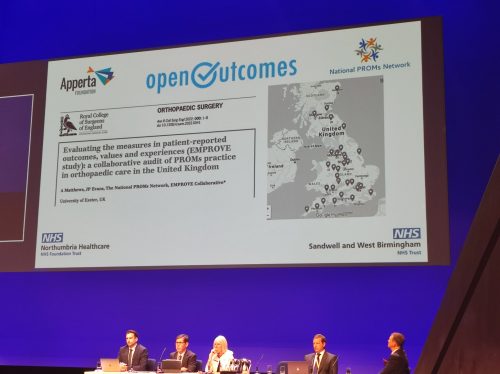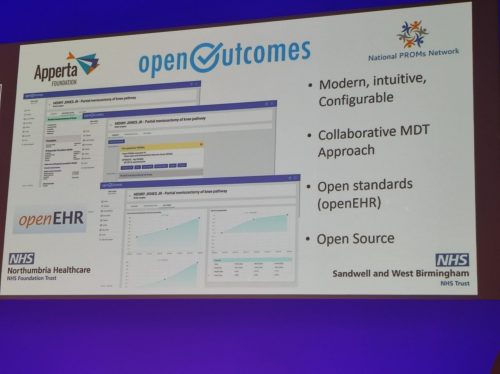Group 1 – Which PROMs should be collected?
This group is looking at the questionnaires available, and the various orthopaedic registries’ and various specialist societies’ requirements. Group lead: Mr Ajay Malviya, Consultant Orthopaedic Surgeon, Northumbria Healthcare NHS Foundation Trust
Initial call held discussing:
- What’s collected now and what should we be collecting routinely?
- Understanding what we want to do with the scores and how that will influence what’s collected and what’s the frequency of collection.
- Use of a ‘quick dashboard on discharge’ and how to collect data on elective and trauma
- Incorporation of quality of life scores further down the line
- Link to NJR
Initial action plan:
- Group 2 members to share what’s currently being collected
- Gather opinions from clinicians and societies and registries about what should be collected and why
- Understand what physiotherapists are using in the community
- Once all information received, collate to enable group to see commonalities and outliers
- Ask specialist societies for their opinions
- Another call may be held to discuss the findings.
- The group leads will discuss the progress of their groups and their next steps.
Completed activity:
- Group 2 has now completed their own audit and the EMPROVE audit in collaboration with SWORD – see working group 2 below.
Action Plan:
- Group 1 to use group 2 findings to see if any consensus can be found as a starting point for standardisation.
- Our findings showed greatest variation in upper limb PROMs collection. It was noted that ICHOM have published a new hand/wrist standard set very recently which could perhaps influence a change in practice in the UK.
- Reach out to the orthopaedic specialist societies to look to see if possible to standardise PROMs practice by issuing guidance and information.
Group 2 – Current PROMs practice
This group’s members are sharing experiences of how their organisations currently send, receive, follow up and collate questionnaires. Group lead: Anji Kingman, Clinical Outcomes Manager Northumbria Healthcare NHS Foundation Trust
Initial group call held with the following discussions:
- All feel they need clear direction and instruction on how they should be dealing with PROMs and would like to share their current practices.
- It was noted that some organisations have dedicated PROMs staff and others don’t. What effect does this have on collecting PROMs?
- What should the timescales be for collecting them?
- Many are working off different systems. Which is best?!
Initial Action plan:
- Group members to share their unit’s current practice for Orthopaedic PROMs collection.
EMPROVE audit findings: We were delighted to have worked with the SWORD team building on our work looking into PROMs practice in elective orthopaedics. An article has been published by the BOA and is in press by RCS Annals – online article available via your personal or organisation Athens account. Now we all need to work together to take it further and aim to standardise. This is essential to properly help service improvement, clinicians, researchers, industry and of course PATIENTS. Thanks to all collaborators, the PROMs Network team, the South West Orthopaedic Research Division and special mention to our late, much missed friend and colleague, Rebecca Lafferty.
Completed activity:
- As part of the work by group 2, 8 organisations shared information on which PROMs tools they use, when and how patients are asked to complete pre-op and post-op questionnaires and which, if any, registries are used.
- Findings were collated and shared with network members for further discussion and we had a very productive group call discussing our findings. It was great to hear more detail of the wonderful work by other trusts and we are keener than ever to standardise, share, & grow together. With thanks to Prof. Reed for chairing an excellent discussion and to everyone who attended and contributed. (Aug 2020)

Action Plan:
- Group 1 to use group 2 findings to see if any consensus can be found as a starting point for standardisation and EMPROVE findings to try to engage with specialist societies.
- Our findings showed greatest variation in upper limb PROMs collection. It was noted that ICHOM have published a new hand/wrist standard set very recently which could perhaps influence a change in practice in the UK.
Group 3 – Development of openOutcomes – open standards and open source software for the collection and analysis of PROMs data
This group is working on the PROMs platform initially developed by Northumbria Healthcare with the Apperta Foundation and is led by Professor Mike Reed, Consultant Orthopaedic Surgeon, Northumbria Healthcare NHS Foundation Trust and Mr Kanthan Theivendran, Consultant Orthopaedic Surgeon, Sandwell and West Birmingham Hospitals NHS Trust.
Executive Summary which you can download and share with colleagues. (Click here)
Background (click here for slides)
Description of the project on the Apperta website here
Progress:
The openOutcomes committee, Apperta team and our brilliant professional developers are thrilled to say that we have been successful in obtaining funding from NHS Transformation (formerly NHSx) via the MSK Adoption fund along with funding from the North of England Commissioning Support unit (NECS) to build a best-in-class solution PROMs platform.
We currently are near completion of the core minimum viable product (MVP) for the openOutcomes platform which can read and pull patient demographics from PAS and allow staff access via Active Directory (using their hospital password). We are now testing it in one NHS Trust for feedback and bug fixing (Sept 2022) before offering the platform to further trusts subscribed to the project.

We have an FAQ document and are happy to be contacted if your trust would like to learn more and potentially subscribe. We want clinicians and their departments to get involved, subscribe to use the product and help to shape its future. Subscribers are being invited to take a seat on our committee if they so wish, to govern product development and to decide how future investment should be spent.
Follow on us on Twitter or E-mail: info@apperta.org
The Apperta Foundation is a not-for-profit community interest company supported by NHS England and NHS Digital led by clinicians to promote open systems and standards for digital health and social care.
We want to make the data, information and knowledge in IT systems open, shareable and computable to facilitate the creation of innovative digital services to transform the delivery of health and social care. This would meet the needs of the Government’s response to the Cumberlege Report and adheres to NHS standards.
Group 4 – The analyses and uses of PROMs data.
This group is looking at how the results are analysed, the best uses of the data and benchmarking and is led by Sammy Davies, Quality Outcomes Manager, The Robert Jones and Agnes Hunt Orthopaedic Hospital NHS Foundation Trust (RJAH)
Initial call held discussing:
- Need to define/clarify what data is useful recognising differences in requirements for primary use (e.g. as part of consultation) and secondary use (e.g. reports to boards).
- Real time data best for Consultants in clinic. Use of virtual assessment/reviews would help this.
- An alert needs to be created to identify if a patient needs to return to clinic. This is probably still being done manually by PROMs scores and clinicians.
- How PROMs data is utilised as part of virtual assessments.
- Need to share and learn the different ways with how PROMs data is currently utilised.
- If everyone collected the same data and analysed it in the same way then putting the data together would be simpler when needed then can share and benchmark easily.
- Duplication- awareness of duplication within a Trust due to different systems in operation and also care not to duplicate what the Registries are doing.
- Patient level data can be returned from NHSE if requested for hip and knee PROMs. Only one person per Trust can register to receive. Analysis can then be performed on the raw data to support consultant appraisals and allow for peer comparisons.
- Literature reviews on how PROMs measurements have been used in healthcare could be useful to share with the group.
Initial action plan:
- Sharing of current ways of presenting data at all levels to know what everyone does.
- Group to liaise with the library team and share literature reviews on PROMs measurements.
- Possible workshops/webinars on using the data from PROMs following findings.
- Another call may be held to discuss the findings.
- The group leads will discuss the progress of their groups and their next steps.
